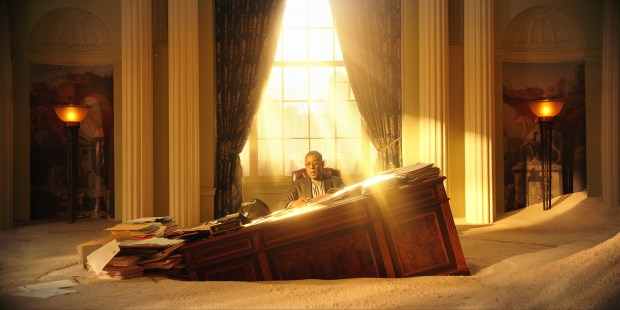Naive, decadent, sluggish, dazzling, touchingly sincere in its belief that “a vital conversation” about the state of our nation can save us, even with barbarians at the gates: There’s something to vex everyone in “Megalopolis.” Francis Ford Coppola’s new film is a philosophical argument for the artist’s place in society disguised as a movie that does not care for delivering what you want, or think you need.
It’s a grandiloquent $120 million fable of America’s imminent ruin, following the ancient Rome playbook, and a cinematic swing for the fences visible only to Coppola.
Should you go? I am not going to tell you to go, or not to. I will tell you that I’ve been shaking my head, and smiling, about my own frustrations and occasional astonishments at the messy whole of it, a day after watching it. It’s a last-call declaration of principles. It’s also not much like any previous Coppola film, either in the cultural touchstone realm (the first two “Godfather” epics) or the quiet, haunting masterwork category (“The Conversation”) or compared to his recent, self-described low-budget “student films” (“Tetro,” “Youth Without Youth”).
On the other hand, like most male film directors making lavish spectacles about decadent empires before him, Coppola seizes every available opportunity to throw in vestal virgins and the like. There’s a semi-embarrassing adolescent spirit alongside a wizened octogenarian’s self-reflection at work, and play, in this project. In risk and reward terms it’s closest, probably, to Coppola’s “One From the Heart” (1982), a hermetic, alluring blur of a movie about the difficulty of love.
“Megalopolis” is a movie about loving difficulty, and the challenge facing a filmmaker pouring his feelings and words and images of despair and hope into some workable shape for public consumption.
Roughly as stressed as Gary Cooper was grappling with Ayn Rand’s dialogue in the film version of “The Fountainhead,” Adam Driver plays visionary architect and physics-defying inventor Cesar Catilina. The genius’s discovery of the wonder metal megalon holds the key to an urban renewal project for the great, battered city of New Rome (Manhattan, with ancient Roman flourishes). Presumably for the health insurance, Catilina is on the city payroll as head of the Design Authority under the skeptical eye of Mayor Cicero (Giancarlo Esposito), a pawn in the hands of the plutocrats who got him elected. Jon Voight, looking alternately lost and eagle-eyed, is the richest pluto in town. Shia LaBeouf slithers hither and yon as an incestuous schemer with take-back-our-country rabble-rousing skills and ambitions.
Parts of Coppola’s narrative are super-simple, or super-simplistic. Catilina’s sometime lover, the odious celebrity journalist Wow Platinum (Aubrey Plaza), represents media rot, while the mayor’s socialite daughter Julia Cicero (Nathalie Emmanuel) feels her heart grow three sizes once she enters Catilina’s orbit and bedroom. There are some questions for the audience’s string-along benefit: Did Catilina murder his wife years ago, though he was cleared of wrongdoing? Can New Rome become Catilina’s dream of a new New Rome, with liberty and justice for all?

Coppola is plainly disinterested in story momentum or conventions, and since the film itself periodically quotes whole chunks of Catullus and William Shakespeare (Driver knocks out a big piece of “To be or not to be” at one thinly motivated point), it’s fair to say “Megalopolis” is a spiritual cousin to Shakespeare’s nutty, half-mad, late-period romances. Sometimes he’s his own worst enemy, as in the early scene of Catilina demonstrating a model of his utopian wonderland. It’s staged and edited for a weird amount of confusion and muddle. Elsewhere, Coppola and his crack cinematographer Mihai Malaimare Jr. find a lovely flow and glide for conversations in Catilina’s Chrysler Building design studio.
The movie’s like that — stilted one minute, a reminder of Coppola’s mastery the next.
He’s in love with split-screen triptych imagery in “Megalopolis,” an homage to Abel Gance’s silent epic “Napoléon.” I wish more of the script’s words expressed ideas than Coppola’s attempts at high-flown rhetoric. By the end, with Coppola daring to rewrite the Pledge of Allegiance for a brave new world, this half-crocked dream leaves you in a fugue state, because it is one.
It’s something of an in-joke, albeit a sobering one, that the most startling moment in “Megalopolis” is a calmly framed act of violence that wouldn’t be out of place in the Corleone saga. Its impact stands out amid the film’s wanderings. I haven’t even mentioned that Catilina has the ability to stop time and restart it again. Why? How? Wrong questions, the movie says. “It is required that you do awake your faith,” as Shakespeare reminded us in “The Winter’s Tale.” Coppola’s right, even when his movie’s not quite right in the head: Catilina’s mantra — “When we leap into the unknown, we prove we are free” — speaks for obsessive individualists with T-square rulers as well as entire nations whose futures, if they can manage one, must be made from a troubled and troubling present.
“Megalopolis” — 2.5 stars (out of 4)
MPA rating: R (for sexual content, nudity, drug use, language and some violence)
Running time: 2:18
How to watch: Premieres in theaters Sept. 27
Michael Phillips is a Tribune critic.



